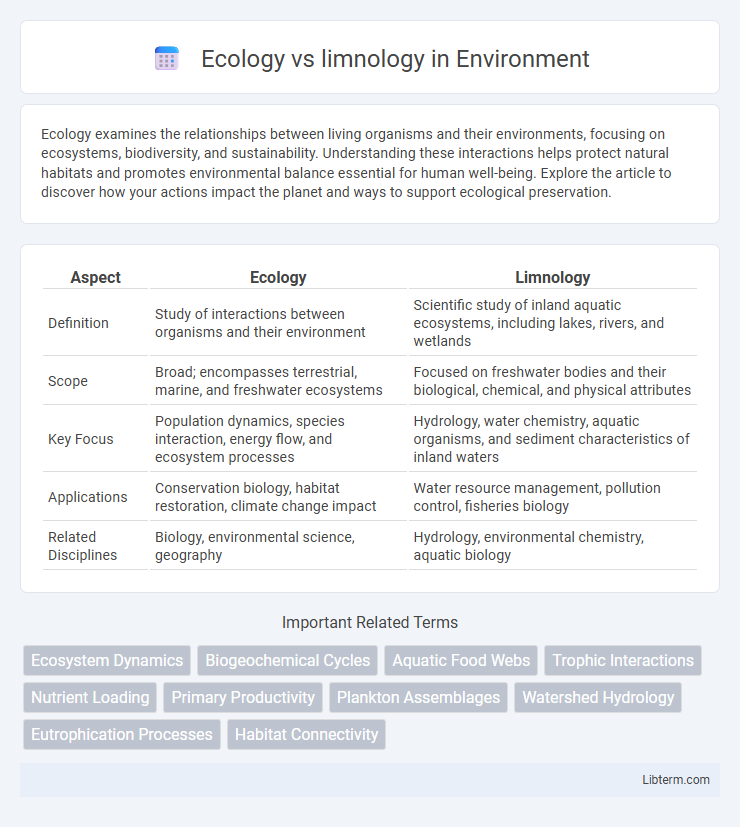Ecology examines the relationships between living organisms and their environments, focusing on ecosystems, biodiversity, and sustainability. Understanding these interactions helps protect natural habitats and promotes environmental balance essential for human well-being. Explore the article to discover how your actions impact the planet and ways to support ecological preservation.
Table of Comparison
| Aspect | Ecology | Limnology |
|---|---|---|
| Definition | Study of interactions between organisms and their environment | Scientific study of inland aquatic ecosystems, including lakes, rivers, and wetlands |
| Scope | Broad; encompasses terrestrial, marine, and freshwater ecosystems | Focused on freshwater bodies and their biological, chemical, and physical attributes |
| Key Focus | Population dynamics, species interaction, energy flow, and ecosystem processes | Hydrology, water chemistry, aquatic organisms, and sediment characteristics of inland waters |
| Applications | Conservation biology, habitat restoration, climate change impact | Water resource management, pollution control, fisheries biology |
| Related Disciplines | Biology, environmental science, geography | Hydrology, environmental chemistry, aquatic biology |
Introduction to Ecology and Limnology
Ecology is the scientific study of interactions between organisms and their environments, encompassing terrestrial, marine, and freshwater ecosystems to understand biological diversity and ecosystem dynamics. Limnology specifically focuses on the biological, chemical, and physical properties of inland aquatic systems such as lakes, rivers, and wetlands, providing detailed insights into freshwater ecology. Both fields share foundational concepts but differ in scope, with ecology covering broader environmental interactions and limnology concentrating on freshwater habitats and their processes.
Defining Ecology: Scope and Importance
Ecology encompasses the study of interactions among organisms and their environments across diverse ecosystems, emphasizing the complex relationships that sustain biodiversity and ecological balance. Limnology, a specialized branch within ecology, focuses exclusively on inland water bodies like lakes, rivers, and wetlands, investigating physical, chemical, and biological dynamics unique to aquatic habitats. Understanding ecology's broad scope aids in addressing global environmental challenges by integrating data on terrestrial and aquatic systems, including limnological insights critical for freshwater conservation.
Understanding Limnology: Focus and Applications
Limnology specializes in the scientific study of inland aquatic ecosystems, including lakes, rivers, and wetlands, emphasizing their physical, chemical, and biological properties. It explores nutrient cycling, water quality dynamics, and freshwater organisms' interactions, contributing critical insights into ecosystem health and environmental management. This discipline informs practical applications such as water resource conservation, pollution control, and habitat restoration, differentiating it from broader ecological studies that cover terrestrial and marine environments.
Historical Development of Both Fields
Ecology, established in the 19th century by scientists like Ernst Haeckel, developed as a broad study of the interactions between organisms and their environments, emphasizing ecosystems and biodiversity. Limnology emerged in the early 20th century, pioneered by Francois-Alphonse Forel, focusing specifically on the biological, chemical, and physical properties of inland aquatic systems such as lakes and rivers. The historical development of limnology was shaped by advancements in water chemistry and biology, distinguishing it from the wider ecological studies of terrestrial and marine environments.
Key Principles and Methods in Ecology
Ecology centers on studying interactions among organisms and their environments, emphasizing energy flow, nutrient cycling, and biodiversity to understand ecosystem functions. Key principles include population dynamics, community structure, and ecological succession, utilizing methods such as field observations, species sampling, and ecological modeling to analyze these processes. In contrast, limnology specifically examines freshwater ecosystems, integrating physical, chemical, and biological factors unique to lakes, rivers, and wetlands.
Foundational Concepts and Techniques in Limnology
Ecology studies the interactions between organisms and their environments, encompassing terrestrial, marine, and freshwater systems. Limnology specifically examines inland freshwater ecosystems such as lakes, rivers, and wetlands, focusing on their physical, chemical, and biological properties. Foundational techniques in limnology include water sampling, nutrient analysis, and bioassessment methods to monitor aquatic health and ecosystem dynamics.
Overlapping Areas: Where Ecology Meets Limnology
Ecology and limnology intersect significantly in the study of freshwater ecosystems, where ecological principles are applied to understand the biological, chemical, and physical interactions within lakes, rivers, and wetlands. Both disciplines analyze species distribution, nutrient cycling, and energy flow to assess ecosystem health and predict responses to environmental changes. This overlap enhances comprehensive management strategies for freshwater conservation and restoration efforts.
Differences in Research Approaches and Objectives
Ecology broadly investigates interactions among organisms and their environments across terrestrial, marine, and freshwater systems, emphasizing ecosystem dynamics and biodiversity patterns. Limnology specifically studies inland aquatic ecosystems such as lakes, rivers, and wetlands, focusing on physical, chemical, and biological processes unique to freshwater environments. Research objectives in ecology often aim to understand population regulation and community structure, while limnology prioritizes water quality, nutrient cycling, and aquatic habitat health.
Real-world Applications: From Ecosystem Management to Water Quality
Ecology and limnology both play crucial roles in ecosystem management and water quality improvement by studying interactions within ecosystems and freshwater bodies, respectively. Ecology provides broad insights into species interactions and energy flows that inform habitat restoration and biodiversity conservation, while limnology offers valuable data on chemical, physical, and biological processes in lakes and rivers to guide pollution control and aquatic resource management. Integrating ecological principles with limnological research enhances sustainable practices for maintaining healthy watersheds and preventing environmental degradation.
Future Directions and Integration of Ecology and Limnology
Future directions in ecology and limnology emphasize the integration of interdisciplinary approaches to address complex aquatic and terrestrial ecosystem dynamics under climate change. Advances in remote sensing, molecular biology, and bioinformatics enhance the ability to monitor biodiversity, nutrient cycling, and habitat connectivity, promoting ecosystem resilience. Collaborative research frameworks combining ecological theories with limnological data improve predictive models for sustainable water resource management and biodiversity conservation.
Ecology Infographic

 libterm.com
libterm.com